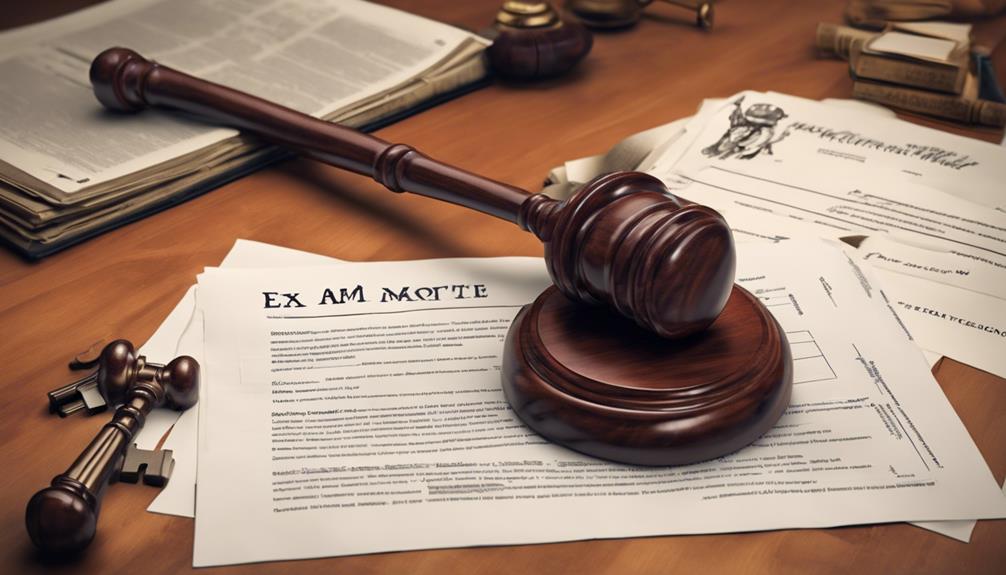In order to succeed in an Ex Parte hearing, it is crucial to remember that taking proactive steps often results in positive results. The key question is: How can we guarantee that we are the proactive side in a courtroom scenario?
Well, let's just say there's a strategy involved that goes beyond just showing up.
So, what's the secret sauce to standing out and making your case heard loud and clear?
Let's explore the key steps to success in navigating the complexities of an Ex Parte hearing.
Key Takeaways
- Urgency and safety prioritized for immediate relief.
- Detail and evidence crucial for persuasive argumentation.
- Anticipate objections and address weaknesses preemptively.
- Clear evidence, legal compliance, and urgency maximize success.
Understanding the Purpose of Ex Parte Hearings
In our legal system, Ex Parte hearings serve as crucial mechanisms for swiftly addressing urgent matters such as child abduction or domestic violence. These hearings prioritize immediate safety and well-being, providing swift relief without the need for a full trial. Ex Parte orders, issued without notice to the opposing party, aim to protect individuals in immediate danger. Understanding the qualifying criteria for such hearings is paramount to ensure successful outcomes, especially in cases involving child custody or domestic violence.
When a situation demands urgent intervention to prevent harm, Ex Parte hearings stand as a vital tool for obtaining immediate legal protection. Whether it be securing a child's safety in a custody dispute or shielding a victim from domestic violence, these hearings act as a shield in times of crisis. By focusing on the qualifying criteria and presenting compelling evidence, individuals can seek the necessary legal remedies to address pressing concerns promptly. The essence of Ex Parte hearings lies in their ability to deliver swift justice where immediate relief is the key to ensuring the well-being of those in jeopardy.
Preparing a Strong Ex Parte Motion

To craft a compelling Ex Parte motion, meticulous attention to detail and a clear presentation of urgent circumstances are essential. Our Ex Parte motion must contain detailed and specific facts that support our request during the hearing. It's crucial to provide clear evidence of the urgency and potential harm if immediate action isn't taken.
Additionally, we need to clearly outline the relief we're seeking and demonstrate how it serves the best interests of the child or addresses the emergency situation at hand. Adhering to all court rules and procedures for Ex Parte applications is vital to increase our chances of success. We should also highlight any previous attempts made to resolve the issue outside of court, emphasizing the necessity of immediate court intervention.
Presenting Persuasive Arguments Effectively
Effectively persuading the court during an ex parte hearing necessitates a meticulous presentation of urgent circumstances supported by concrete evidence and preemptive addressing of potential counterarguments. When presenting persuasive arguments, it is crucial to demonstrate the urgent nature of the situation clearly. Providing concrete evidence, such as specific details, documents, or witness statements, can significantly bolster your case. Additionally, articulating the potential harm or risk involved if the requested relief is not granted promptly helps emphasize the immediate need for action.
| Key Points | Description |
|---|---|
| Urgent Nature | Clearly outline the time-sensitive nature of the situation. |
| Concrete Evidence | Present specific details and evidence to support your arguments. |
| Potential Harm | Articulate the risks or harm involved if relief is not granted swiftly. |
| Counterarguments | Address potential counterarguments proactively to strengthen your case. |
Anticipating Challenges and Counterarguments

Considering the potential objections raised by the opposing party is essential in preparing for an ex parte hearing. Effectively addressing counterarguments can significantly bolster our case. By anticipating challenges and objections, we can proactively strategize to strengthen our position. Understanding the weaknesses in our argument allows us to preemptively address them, making our case more persuasive. When presenting our legal arguments and evidence, it's crucial to anticipate potential counterarguments and be prepared to refute them convincingly.
Identifying possible objections beforehand gives us the opportunity to gather additional evidence or refine our legal arguments to preemptively address them. Being proactive in this manner not only demonstrates thorough preparation but also increases our chances of success during the ex parte hearing. By acknowledging and preparing for potential counterarguments, we show a comprehensive understanding of our case and are better equipped to present a strong and compelling argument that can withstand challenges.
Maximizing Your Chances of Success
In order to enhance our prospects of success in an ex parte hearing, we must meticulously prepare by presenting clear and compelling evidence of the emergency situation necessitating immediate action.
When filing an ex parte motion, it's crucial to adhere to all legal requirements diligently. We need to demonstrate the potential harm or irreparable damage that could result if the order isn't granted swiftly.
Articulating why waiting for a regular hearing wouldn't serve the best interest of those involved is paramount. By highlighting any efforts made to involve the other party, if applicable, we show transparency and fairness.
Our strategy should focus on the urgency of the situation and the necessity for prompt intervention to prevent further harm. By presenting a well-structured argument supported by concrete evidence, we can maximize our chances of success in obtaining the necessary order to address the emergency situation effectively.
Frequently Asked Questions
Why Would an Ex Parte Order Be Denied?
If an Ex Parte order is denied, it could be due to insufficient evidence of urgency or emergency, failure to follow proper procedures, lack of necessary documentation, or a request lacking clarity or specificity.
These factors can lead to a denial if the situation doesn't meet the court's criteria for an emergency or if the request fails to meet the legal standards required for urgent relief.
How Do You Respond to an Ex Parte?
We respond to an ex parte by promptly filing a written response with the court, including all relevant information and legal arguments to counter the request. Providing evidence or documentation to support our position and requesting a full hearing are crucial steps.
Consulting with an experienced attorney will guide us through the process, ensuring our response is effective in challenging the ex parte order.
How Do You Object to an Ex Parte Motion?
When we object to an Ex Parte motion, we must file a written response with the court, clearly outlining our reasons and providing evidence or legal arguments to support our objection.
Timing is crucial, so we ensure our response is filed according to the court's rules and deadlines.
Following proper legal procedures and guidelines is essential to effectively presenting our case and having our objections reviewed.
What Is Ex Parte Decision?
Ex parte decision is when a judge makes a ruling without hearing from the other party. It's usually done in urgent cases to address critical issues.
The decision relies on the information provided by the party seeking the order. These decisions are temporary and lead to a full hearing where both sides can present their arguments.
They aim to offer quick relief in emergencies while ensuring due process.
Conclusion
In conclusion, winning an Ex Parte hearing requires thorough preparation and strategic presentation.
Are you ready to navigate the complexities of the legal system and advocate effectively for your case? By understanding the purpose of Ex Parte hearings, preparing a strong motion, presenting persuasive arguments, and anticipating challenges, you can maximize your chances of success.
Stay focused, stay prepared, and trust in your ability to make a compelling case in court.









